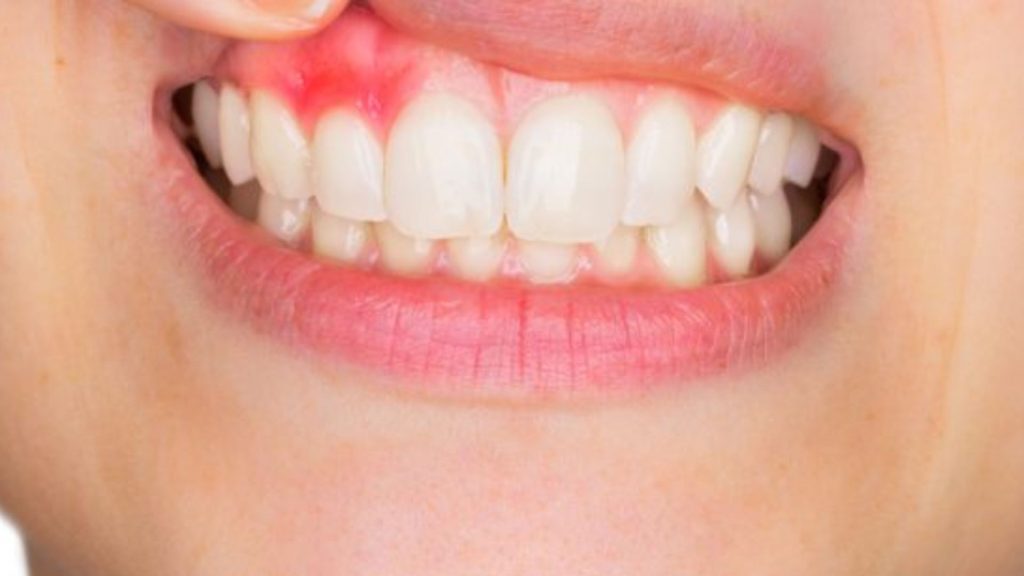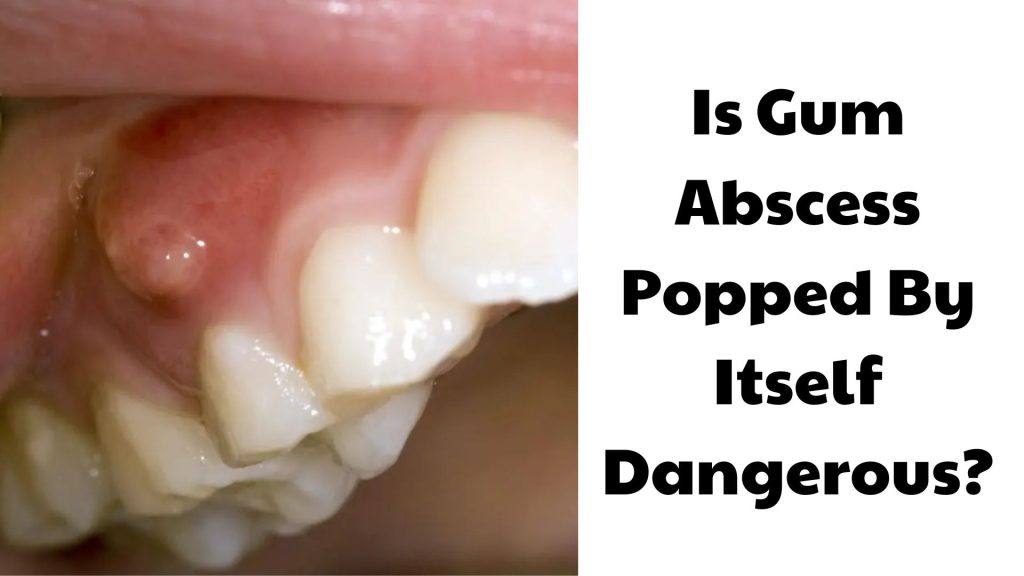“Gum abscess popped by itself” – many people are concerned and inquisitive about this subject. Sudden gum abscesses might raise issues about your oral health and if you need a dentist. In this post, we will learn about this phenomenon and determine if it is a sign of natural healing or whether professional help from a dentist is required.
What Is A Gum Abscess?

A common cause of serious infections, swelling, and inflammation in any part of the body is bacteria, which can cause an abscess. When the immune system figures out that germs are harmful, white blood cells will help kill them. White blood cells and germs that have died are mixed with body fluids to make pus. Gum abscesses also form in the same way.
Most of the time, they are caused by a tooth root infection, which happens when deep sinuses form below the broken gum line. When the tooth root is infected, saliva has some mild antiseptic properties that can’t be used, and the gum tissue likes to drain the infected fluid. So, the pus can’t get out through the gum line. Instead, it builds up at the root of the tooth, making an abscess.
In severe cases, when tooth decay splits the tooth or is caused by physical trauma, germs enter the pulp and cause it to die. As pus grows in the jawbone roots, swelling and inflammation extend throughout the jaw. An untreated dental abscess can cause a dangerous infection in the tooth, jawbone, and surrounding tissues.
The Most Common Gum Abscess Symptoms
The signs of a gum abscess are obvious. The greater the abscess, the more nerves and tissues it affects, hence the more severe the symptoms. When a patient has a tooth abscess, the area around the infected tooth will swell significantly before the edema spreads to the rest of the jaw and face. Also, patients experience dizziness, fever, chills, sweating, hot flashes, and other bodily infection symptoms. Occasionally, swelling and pain spread to the face and neck. In response to disease-causing germs, the immune system causes fever. The condition progresses faster with antibiotics and supportive medications to weaken microorganisms. However, if patients do not receive treatment or receive inadequate treatment, they may experience:
Diffuse Tissue Inflammation
If a gum abscess is not treated or managed correctly, the risk of extensive gingivitis increases. Gingivitis is a common tooth condition that arises when bacteria and plaque build-up around the gums. Gum sores can make it tougher to clean your teeth, which can cause gum infections to spread. In diffuse gingivitis, gum swelling, dark redness, pain, and bleeding when brushing or flossing are typical. Bad breath is another common sign. In more serious cases, gum disease can cause damage to the jawbone and make teeth loose or easy to lose.
Superficial Abscess
Fistulas form in the cheeks and under the chin as a result of this disorder. The patient now has irritation on the floor of the mouth and in the temporal fossa. Not only does the agony worsen, but the condition also endangers the patient’s health and life.
Maxillary Sinus, Endocarditis
Another name for maxillary sinus infection is sinus endocarditis. This is a tough illness that isn’t always caused by a gum abscess. In some cases, gum sores can lead to endocarditis or an infection of the maxillary sinus. Sinus endocardial bacteria or viruses cause most maxillary sinus infections. In gum sores, bacteria may proliferate. The inability to clean gums covering the front of teeth might cause gum disease. Without treatment, gingivitis may spread and damage nasal tissue. This tissue swelling may cause headaches, eye discomfort, and maxillary sinus infection discharge.
Is Gum Abscess Popped By Itself Dangerous?

Tooth root abscess is a dangerous dental condition that may lead to consequences if not treated promptly, particularly if the pus ruptures. After the abscess ruptures, discomfort is brief. After that, the pain and symptoms usually go away without treatment. As a result, many patients are subjective and believe the abscess has been totally eradicated. A burst tooth root abscess, on the other hand, is a dangerous disease that needs immediate intervention and treatment.
Therefore, “Is a self-rupturing tooth root abscess pus dangerous?” According to top doctors, a pus abscess in the root of a damaged tooth is quite harmful. If not addressed immediately, serious consequences such as:
- Oral necrosis: When pathogenic germs travel to the mouth floor, jaw, and tongue, complications might occur. Long-term, this disease may lead to necrosis in the mouth floor and airway blockage, jeopardizing the patient’s life.
- Maxillary sinus infection: When a tooth’s pus abscess ruptures, the germs might migrate to the maxillary sinus, infecting it.
- Increased risk of tooth loss: If the abscess grows, germs may damage the tooth pulp and root. This may loosen tooth tissue, increasing tooth loss risk. The tooth root may break from the jaw and fall out if not controlled in time.
- Brain abscess: Tooth root abscess pus ruptures may cause brain abscesses, which are dangerous. Bacteria attacking the nervous system may spread to the brain and create an abscess.
Can Popping A Gum Abscess Kill You?
Squeezing the abscess in the gum (the gum that covers the top of the tooth) may create major health complications. Using sharp equipment to squeeze a gum abscess, on the other hand, may result in infection and discomfort. You risk infection, gingivitis, and even tooth loss if you push your gums too tightly. Without first contacting a trained medical practitioner, do not try any kind of dental surgery or treatment.
Gum Abscess Popped By Itself – What To Do?
After the tooth abscess ruptures and pus oozes out, pain and discomfort decrease. However, inflammation-causing microorganisms remain. When discovering a burst abscess, the patient should proceed to the hospital for treatment. Common burst leg abscess treatments include:
Emergency Treatment
If you develop an oral abscess, you should contact a doctor as soon as possible to drain the pus, protect the tooth root, and prevent the illness from spreading.
To begin, the dentist will instruct the patient to clean their mouth with an antibiotic solution to remove the cyst. Following that, the abscess is thoroughly cleansed to remove any bacteria or plaque that may cause sickness.
Your dentist may prescribe medications to be taken orally for 7-15 days in order to destroy bacteria and prevent the illness from returning. This prevents pathogens from spreading.
Furthermore, if the abscess produces discomfort, swelling, or fever, the dentist may recommend pain relievers like Ibuprofen, Naproxen, Paracetamol, Diclofenac, or even antipyretics. These medications help people feel better by alleviating symptoms.
Treat The Cause
Statistics show that tooth root abscesses are often caused by periodontal disease, dental decay, and severe progressive trauma. As a result, after the infection has been controlled, an expert will determine the reason and then use a way to treat the main problem. Specifically:
- Tooth crown: In the event that an abscess or excessive fillings have caused significant harm to the tooth. Dental crowns may help restore chewing ability and protect teeth from further damage. Grinding down natural teeth and overlaying them with false ones is the process of getting a dental crown.
- Root canal: The majority of tooth abscesses begin with infection or necrosis of the tooth pulp. In the event of pulpitis, the doctor may suggest cutting holes in the tooth surface, cleaning the affected pulp region, and filling the hole with synthetic material.
- Tooth extraction: If the damage caused by a tooth root abscess is severe, the doctor may recommend tooth extraction. This surgery prevents the abscess from reoccurring and the infection from spreading.
- Other measures: Each tooth root abscess case is treated differently depending on the source and damage. The doctor may suggest gum grafts, dental fillings, periodontal pocket surgery, etc.
How To Avoid Spontaneous Gum Abscess Rupture?

A burst gum abscess is a severe dental problem that must be checked and treated as soon as possible to prevent potentially deadly consequences. In addition to following the specialist’s directions, patients must take proactive steps to avoid infection and recurrence in the long run:
- First, a balanced diet with appropriate calcium and minerals is essential for tooth and jawbone health. To keep your teeth from getting damaged, don’t eat or drink anything sugary or acidic after dining.
- Healthy teeth are essential. Remove plaque and bacteria from your teeth by flossing every day and brushing your teeth at least twice a day with a soft toothbrush. This prevents gum and tooth abscesses. Regular gum exams and cleanings at the dentist are essential for dental health.
- Also, you should not grind your teeth and, if you have to, wear a toothcap at night to keep them safe from hitting themselves. Avoid using teeth for unrelated chores and minimize dry mouth treatments. Finally, understand dental genetics and family history for better prevention and care.
Remember that the best ways to keep your mouth healthy and stop tooth sores from breaking open on their own are to take care of your teeth and follow preventative measures.
Conclude
In our search for “gum abscess popped by itself,” we learned that oral wellness is important. A gum abscess or dental infection may indicate several dental issues and can resolve on their own. This shouldn’t prevent us from seeing the dentist. Spring Orchid Dental Clinic is always ready to greet you and provide superior dental treatment and attentive attention. Regular dental checkups allow you to examine and analyze your oral health, ensuring that you don’t overlook any concerns that may be lurking under the surface. This preserves your health and keeps your smile bright.
Let us give you a confident, healthy smile. Visit Spring Orchid Dental Clinic now for real dental treatment. We’ll help you keep a healthy grin.
FAQs
Is It Good If A Gum Abscess Is Draining?
No, it isn’t. Having a pus-oozing gum abscess demands particular dental care. This frequently indicates gum infection or inflammation. This illness causes pain and may lead to more severe issues if left untreated. Bleeding gums impair dental and general health. It may transmit the illness to other oral and body areas, creating serious problems. It’s crucial to call your dentist right away for guidance and treatment. Early treatment helps prevent infection, minimize pain, and improve dental and general health. For oral and general health, get expert treatment before this disease worsens.
Will A Popped Abscess Heal On Its Own?
In certain situations, a ruptured gum abscess may heal on its own; however, this recovery is dependent on the source of the lesion and the severity of the problem. After a while, a minor gum abscess or a purulent gum abscess may heal on its own. Avoid hard meals and brush softly and floss during this period. However, you must closely check your condition. If the issue worsens or causes pain, swelling, or pus, consult a dentist immediately.
How Long Can A Gum Abscess Last?
The duration of a gum abscess depends on numerous variables. This covers abscess etiology, treatment, constitution, and age. Usually caused by gum infection or tooth root abscess. Gum abscesses last depending on the cause. Gum infection may develop an abscess that lasts a few days to a week with good dental care. Early dental therapy might shorten gum abscess duration. The dentist may clean gums, prescribe drugs, and provide home dental care advice. Each person has a varied constitution, thus gum abscess recovery duration varies. Youthful individuals heal quickly. To prevent significant tooth issues, frequent dental care and following your dentist’s advice are always necessary. If an abscess continues or worsens, see a dentist for assessment and treatment.





